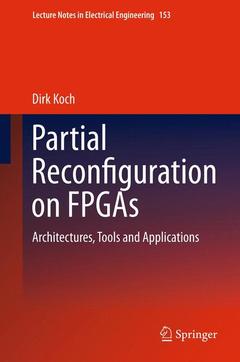Description
Partial Reconfiguration on FPGAs, 2012
Architectures, Tools and Applications
Lecture Notes in Electrical Engineering Series, Vol. 153
Author: Koch Dirk
Language: English
Subjects for Partial Reconfiguration on FPGAs:
Partial Reconfiguration on FPGAs
Publication date: 08-2014
296 p. · 15.5x23.5 cm · Paperback
Publication date: 08-2014
296 p. · 15.5x23.5 cm · Paperback
Partial reconfiguration on FPGAs: architectures, tools and applications (Lecture notes in electrical engineering, Vol. 153)
Publication date: 07-2012
296 p. · 15.5x23.5 cm · Hardback
Publication date: 07-2012
296 p. · 15.5x23.5 cm · Hardback
Description
/li>Contents
/li>Biography
/li>Comment
/li>
This is the first book to focus on designing run-time reconfigurable systems on FPGAs, in order to gain resource and power efficiency, as well as to improve speed. Case studies in partial reconfiguration guide readers through the FPGA jungle, straight toward a working system. The discussion of partial reconfiguration is comprehensive and practical, with models introduced together with methods to implement efficiently the corresponding systems. Coverage includes concepts for partial module integration and corresponding communication architectures, floorplanning of the on-FPGA resources, physical implementation aspects starting from constraining primitive placement and routing all the way down to the bitstream required to configure the FPGA, and verification of reconfigurable systems.
Preemptive Hardware Task execution.- Intra-FPGA Communication Architectures for Reconfigurable Systems.- Building Partially Reconfigurable Systems – Methods and Tools.- Applications and Use Cases.
Introduction.- Intra-FPGA Communication Architectures for Reconfigurable Systems.- Building Partially Reconfigurable Systems: Methods and Tools.- Self-adaptive Reconfigurable Networks.- Reconfigurable CPU Instruction Set Extensions.- Concluding Remarks.
Provides comprehensive overview of state-of-the-art partial run-time reconfiguration techniques, including architectures, methods, and tools Focuses on real applications that will benefit from partial reconfiguration Describes methods and tools to implement efficient, reconfigurable systems that can substantially improve cost, power consumption, or speed (throughput/latency) Includes practical use-cases that act as design patterns for a wide range of applications
© 2024 LAVOISIER S.A.S.




